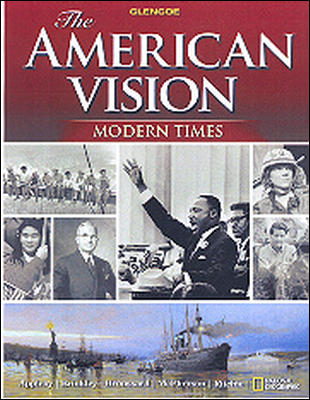The American Vision: Modern Times © 2008Chapter 17:
The New Frontier and the Great SocietyWeb Lesson PlansIntroduction
Students have read about Kennedy's 1961 speech that challenged Americans to
land a man on the moon by the end of the decade. In this activity students
will review an exhibit from the National Air and Space Museum that follows the
events leading up to Neil Armstrong's first step on the moon.
Lesson Description
Students will use information from the Apollo to the Moon Web site to learn
about the efforts to land a man on the moon. Students will read quotes from
President Kennedy, view photos of artifacts from the mission, and examine documents
that detail the commitment of the United States to the project. Students will
then answer four questions and apply this information by writing an imagined
conversation between themselves and President Kennedy concerning some of the
achievements of the space program.
Instructional Objectives- Students will identify the motivations of the space race and characterize
the ways in which the government mobilized to achieve the goal of landing
a man on the moon.
- Students will be able to use this knowledge to write an imagined conversation
between themselves and President Kennedy concerning some of the achievements
of the space program.
Student Web Activity Answers- When Kennedy linked the Cold War to the space race, he appealed to Americans'
patriotism. He spoke of keeping space "free" for all men to explore,
and he indicated that if the Soviets landed on the moon first, it would signal
Communist dominance. Kennedy appealed to Americans' fears of communism.
- Nearly all of NASA's efforts in space were focused on the lunar landing
mission after Kennedy's speech. NASA began scientific studies of the moon,
and humans began to orbit the earth. At its peak, more than 400,000 people
supported the human and scientific exploration programs.
- The following preceded the first lunar landing: the Ranger, Surveyor, and
Lunar Orbiter spacecraft; Project Mercury; the Gemini Program; and finally
the Apollo program.
- Many Americans felt that the goal of the program had been met with the moon
landing. Others felt the program was just too expensive to continue, especially
since the Cold War was waning. Since the United States had won the race, they
reasoned, why continue to throw tax dollars away?
- Students' dialogues will vary.
 | 




